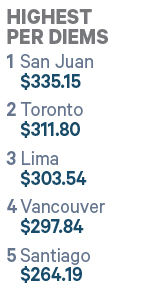
Travel suppliers throughout Latin America had little success in raising travel prices significantly in 2018 amid consistent hotel supply expansion alongside political and economic friction in certain countries—and worse in others. That seems unlikely to change in 2019 as intercontinental travel demand to South America slows, political concerns remain and macroeconomic conditions appear less rosy than they did 12 months ago.
Based on fourth-quarter prices, the most expensive city on BTN's Corporate Travel Index for the Americas—for this report, comprised of Latin America, Puerto Rico and Canada—is San Juan, Puerto Rico, following recovery from 2017's Hurricane Maria. That ranking, though, is a quirk, driven entirely by a luxury hotel rate that far exceeds any city in Latin America and Canada. Puerto Rico's prices in other hotel tiers compared evenly to those in other cities in the Americas.
Chains and independent hotels alike proliferated in Latin America in 2018, adding to the supply that came online ahead of the 2016 Summer Olympics in Brazil, including 10,000 rooms in Rio de Janeiro, according to American Express Global Business Travel. Many of these branded and independent properties are working to attract business travelers, and price hikes in 2019 likely will be limited: BCD Travel predicted general rate increases of 1 percent to 3 percent. To compensate, according to BCD, "hotels are trying to grow revenue by increasingly applying no-show, cancellation and early check-out fees."
BCD additionally warned of weaker-than-expected transcontinental air demand to South America, and the travel management company now projects prices on such fares to remain static or decrease in 2019.
Buenos Aires' 2018 hotel and food costs were similar to those of several of its South American neighbors, but so far in 2019, Argentina's currency has plummeted against the U.S. dollar. Amex GBT projects Buenos Aires hotel rates will increase more than 20 percent in 2019, as measured in Argentine pesos.
Canada
The second-highest 2018 per diem in the Americas outside the U.S. was in Toronto, driven by the highest dining costs in the region, as well as the most expensive taxi ride from its main airport to its center city. Vancouver has a similar profile. Unlike several cities in South America, hotel construction in Toronto and Vancouver has not followed the healthy business travel, leisure travel and meetings demand. As such, rates rose in 2018 and are poised to do so in 2019. "Rates are up by as much as double figures in Toronto and by 6 percent in Montreal and Vancouver," according to BCD.
Per diems are notably lower in the other three Canadian cities on the CTI. Prices for hotels and food in Montreal, Ottawa and Calgary are lower than in Toronto and Vancouver nearly across the board, except Montreal's lower-tier hotel rates, which compare to Toronto and Vancouver's.
Mexico
Mexico City is a per-diem bargain thanks to its rock-bottom food prices and taxi rates. Within the Americas outside the U.S., only Bogota has lower meal costs and only Bogota and Guayaquil have lower taxi costs. But changes are afoot. Mexico has a new president, which initially caused some concern, according to BCD. However, his "conciliatory messages" that boosted the country's economic outlook offered "encouraging news for business travel prospects in 2019." Hotel demand and occupancy remain high, but BCD noted "a wave of hotel openings, especially midscale and extended-stay accommodation," though not all in the city.
Risk
The Americas hosts two of the five most dangerous CTI cities: Guatemala City and San Salvador, according to GeoSure, while Bogota, Mexico City and Rio De Janeiro have concerning risk scores. Guatemala has the highest likelihood in the region of inappropriate behavior toward or assault of women and of harm or discrimination against LGBTQ individuals or groups. Guatamala City, San Juan and San Salvador tied as the cities where travelers are most likely to encounter injury or violence. Bogota topped the list for likelihood of theft.
Toronto and Ottawa are the safest indexed cities in the region, according to GeoSure, and Santiago, Chile, is the safest Latin American city.
For more details on Americas risk ratings and more granular per diem data, check out BTN's Corporate Travel Index Calculator.